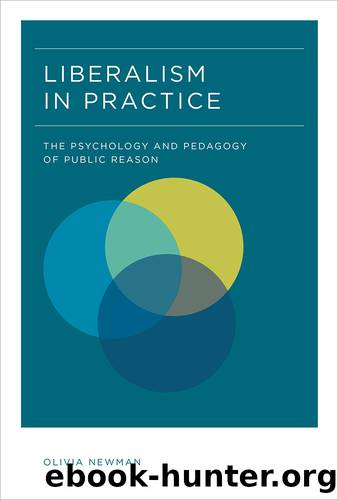Liberalism in Practice by Newman Olivia;

Author:Newman, Olivia; [Newman, Olivia]
Language: eng
Format: epub
Tags: Liberalism, Liberalism--Psychological aspects, Political psychology, Political science--Philosophy, Justification (Theory of knowledge)
ISBN: 9780262028790
Publisher: MIT Press
Published: 2015-03-23T00:00:00+00:00
III The Pedagogy of Public Reason
5 Learning Public Reason
Local institutions are to liberty what primary schools are to science; they put it within the peopleâs reach; they teach people to appreciate its peaceful employment.
âAlexis de Tocqueville (Democracy in America, 1850)
The pedagogy of public reason provides a blueprint for cultivating a commitment to public reason in the domain of public, political deliberation, while avoiding unnecessary interference in other, unrelated domains. In this way, it is able to make two important contributions to the theory of public reason. First, it provides a motivational structure for public reasonâsomething that has not heretofore been adequately laid out. As psychological realism reminds us, âAny contending moral conception owes us both a picture of the motivational structure required for its realization and an argument for believing that this motivational structure is possibleâ (Flanagan 1991, 54). As I explained in the last chapter, our cognitive architecture leaves us well suited to exercising public reason. But can doesnât mean willâwe must still consider how citizens can be induced to act thusly. The pedagogy of public reason offers specific guidance on this question. Second, the pedagogy of public reason responds to the fear of liberal soulcraft by carefully exploiting domain-differentiation. As I have argued, this approach is the least bad option available to true believers in liberal polities, however much they may still object to it.
There is no sure-fire way to ensure that every student will graduate fully prepared to exercise public reason, yet there are pedagogical practices and institutional arrangements that are more likely to cultivate a widespread commitment to public reason, as I discuss in this and the next chapter. In this chapter I consider what it looks like in theory and practice to âlearn public reason,â taking into account a variety of pedagogical considerations. I argue that cultivating public reason requires that all students have opportunities to think about, talk about, and collectively tackle controversial collective problems, in the context of at least some ideological diversity. This will not guarantee that all students become able public reasoners, but, as I discuss, this formula recommends itself for two reasons.
First, it is likely to generate the commitments and dispositions I identify as central to the practice of public reason, even if it is not guaranteed. Second, this rubric is easy to understand and implement and can in fact be satisfied by a wide range of pedagogical practices. This makes it easier to imagine that the pedagogy of public reason could become widespread. Hence the pedagogy of public reason seems likely to yield good results while still being flexible, scalable, and open to variation and innovation in the field.
In order to demonstrate these claims I describe a number of practices that satisfy the pedagogy of public reason, ranging from open classroom discussion about difficult social issues to youth commissions in local government. I survey a wide range of empirical research suggesting that these practices can indeed be effective for my purposes. I conclude
Download
This site does not store any files on its server. We only index and link to content provided by other sites. Please contact the content providers to delete copyright contents if any and email us, we'll remove relevant links or contents immediately.
| Anarchism | Communism & Socialism |
| Conservatism & Liberalism | Democracy |
| Fascism | Libertarianism |
| Nationalism | Radicalism |
| Utopian |
The Secret History by Donna Tartt(16664)
The Social Justice Warrior Handbook by Lisa De Pasquale(11494)
Thirteen Reasons Why by Jay Asher(7803)
This Is How You Lose Her by Junot Diaz(5800)
Weapons of Math Destruction by Cathy O'Neil(5048)
Zero to One by Peter Thiel(4835)
The Myth of the Strong Leader by Archie Brown(4796)
Promise Me, Dad by Joe Biden(4459)
Beartown by Fredrik Backman(4435)
Stone's Rules by Roger Stone(4423)
How Democracies Die by Steven Levitsky & Daniel Ziblatt(4415)
The Fire Next Time by James Baldwin(4352)
100 Deadly Skills by Clint Emerson(4086)
A Higher Loyalty: Truth, Lies, and Leadership by James Comey(4041)
Rise and Kill First by Ronen Bergman(4022)
The David Icke Guide to the Global Conspiracy (and how to end it) by David Icke(3892)
The Farm by Tom Rob Smith(3878)
Secrecy World by Jake Bernstein(3790)
The Doomsday Machine by Daniel Ellsberg(3738)
